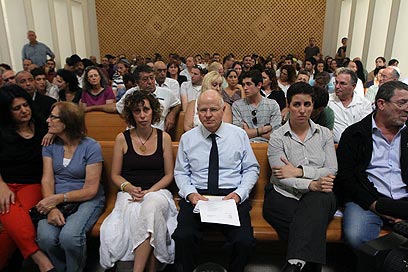


The heavy emotional toll suffered by families of terror victims echoed through the halls of the High Court of Justice on Monday, as it heard four petitions by bereaved families opposing the Shalit prisoner exchange.
The hearing, which often heated to the point where the court bailiffs had to enforce order, saw Gilad Shalit's father, Noam, brave through the pleading of families beseeching the court to stop the release of their love ones' murderers.
Related stories:
- Poll: 79% in favor of Shalit deal
Israel will release 1,027 Palestinian security prisoners in exchange for the Hamas-held soldier, the majority of whom are directly involved in terror attacks that claimed hundred of Israeli lives.
Yossi Mendelevitch, who lost his 13-year-old son in a 2003 suicide bombing in Haifa told the court that "this deal is tainted by so many negative things. I see the court as the last measure that can help protect my living loved ones from these messengers of death. The government belongs to politicians – 26 people voted without knowing what they are voting for. You are the sane ones. Stop this madness!"
Hovev Nuriel, whose father was murdered in 2005, pleaded with the court: "The man who stabbed my father to death is going home. The message sent his way is that violence is rewarded. This deal is not part of any comprehensive ceasefire deal. It's only a way to prove that terror pays. We have become fragments of who we used to be. We want to stop others from joining this blood drenched, damned circle."
- For full coverage of the Shalit deal, click here
The statement was followed by several emotional outbursts from bereaved parents present in the court. "As painful as this is, we can't let everyone speak. This is not the town square," Chief Justice Dorit Beinish said as she decreed order in the court.

Heavy emotional toll (Photo: Gil Yohanan)
Nir Oren, for the Bereaved Families Supporting Peace group, spoke in favor of the deal: "I lost my mother in a terror attack and nothing will bring her back. Vengeance and anger will not help, but the need for vengeance can lead to the suspension of life-saving measures."
Attorney Osnat Mendel, director of the High Court petitions department at the Justice Ministry, asked the court to reject the petitions: "The details pertaining to the deal, including the publishing (of the Palestinian prisoners') names are part of a prisoner exchange agreement. We ask that the court refrain from postponing the deal, even for a short time."
Addressing the families' complaints that they were not given sufficient time to properly contend the list of prisoners included in the deal, she said that in 2009, "The State set up a database detailing the relevant information."
Justice Hanan Meltzer inquired why the State chose to skirt the normal clemency procedures, where the State informs the victim's family about an inmate parole or clemency possibilities, to which Mendel said: "The Law states that the family must petition us to have a say in the matter." Her answer was booed by those present in the court, who wondered aloud: "And how are we supposed to know?"

'I will carry out price tag against murderers.' Shvuel Schijveschuurder
Mendel further claimed that the families' claims that mass clemency was barred under international law was without merit.
Justice Beinish than asked her to explain the criticality to the prisoner exchange's timing, to which Mendel said: "The deal's time table is a big part of its fabric. Any change in it could affect Gilad's fate."
'Delays may be catastrophic'
Attorney Gilad Sher, for the Shalit family, told the court that "This is a sensitive, fragile, volatile deal. Any change in it, any court-ordered delay may be catastrophic.
"The difficulty and pain here are obvious to all of us. The Shalit family is no different from any other family who has lost a loved one," he said.
The Shalits, he added, "Are anxious. They fear the unknown ramifications of any delay or change and they plead the court not to grant any petition whose consequences cannot be predicted."
The High Court is expected to render its ruling on the petitions on Monday evening. "Our hearts are with the families," Noam Shalit told reporters following the hearing. "We understand their pain. We know that this is a very difficult deal. We would have been thrilled if Gilad could be released under the lesser deal, but unfortunately, the State of Israel failed – for five years, to retrieve Gilad. Two governments came and went, IDF chiefs of staff, Shin Bet chiefs and others – they all admitted they failed to create any other alternatives or means of leverage."
The captive soldier's father reiterated that the timing of the deal was critical: "Unfortunately, suspending the deal won't bring the victims of terror back (to life), but it could condemn Gilad to death."

'Fears ramifications of any delay.' Noam Shalit (Photo: Gil Yohanan)
Some of the bereaved parents yelled in response: "You should be ashamed of yourself! Our sons' blood is on your hands."
Earlier Monday, Jerusalem Magistrate's Court Judge Dorit Feinstein rejected a petition filed for a stay of exit order against some of the prisoners slated to be expelled.
The petition was filed by three bereaved families, who sought to file civil damaged suits against their loved-ones killers.
Judge Feinstein said that her court had no jurisdiction over the deal: "With all due empathy to the families' heart-wrenching pain, this petition cannot be granted.
"The State of Israel must balance the bereaved families' interests with those of Gilad Shalit's life, while taking note of broad strategic and political interests, which weighed by this court. Only the High Court of Justice can rule on the validity of the State's decision."
- Follow Ynetnews on Faecbook
- Receive Ynetnews updates
directly to your desktop















